Essential oils, once used only as an air freshener, have grown to become quite the buzz over the past few years. If you are a newbie like me, you’ve tried a bunch of essential oils, and you already know which ones you love.
Nowadays, essential oils are commonly used as a natural remedy for a multitude of minor physical ailments, including anxiety, headaches, insomnia, allergies, bug bites, motion sickness, and diarrhea. Plus, there are oils for beauty and oils to ward off mosquitoes.
Whether you are a newbie or a pro when it comes to essential oils, you already know that this is an excellent way to provide prevention, remedy, and comfort for many travel-related issues and ailments, and should not be left behind when exploring the world with your family.
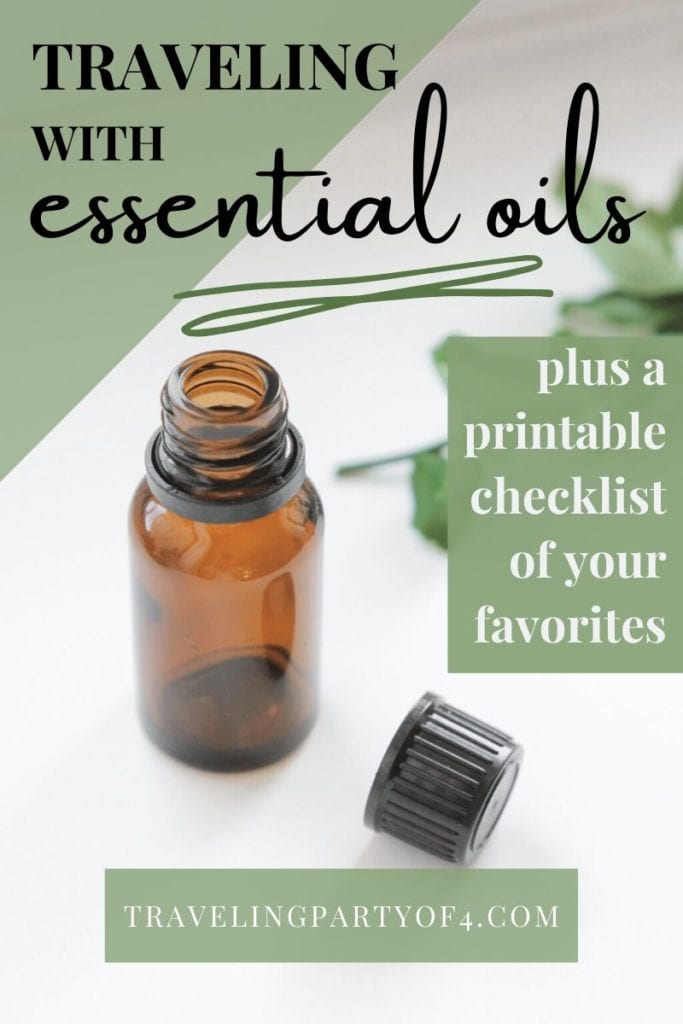
Affiliate Disclosure: There are affiliate links throughout this post. This means if you click on a link and purchase a product through that link, then I will receive a small commission for the referral. And that is kinda cool.
How to Travel with Essential Oils
You can’t wait to get packing and embark on your journey with your family, but it is super important to take your time planning for the big day. Your essential oils can provide comfort and peace while traveling, but there are security issues when transporting any liquid, as you probably already know.
According to TSA regulations, you can transport liquids in your carryon as long as it passes the 3-1-1 rule, which is this, “each passenger may carry liquids, gels, and aerosols in travel-size containers that are 3.4 ounces or less. Each one passenger is limited to one quart-size bag of liquids, gels, and aerosol.”
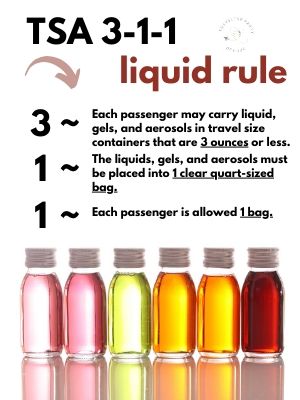
Also, be aware that not everyone is as excited as you are about your oils. When on an airplane, be mindful of those around you who may not be able to tolerate strong smells in an enclosed space. Therefore, use the roll-on delivery method in flight as this will keep the aroma closest to you and, therefore, not offend the others.
How to Use Essential Oils When Traveling
A few drops into your diffuser ~ An oil diffuser releases the scented oil into the air. The aroma will help you achieve the therapeutic benefit of the oil.
Purchase this small travel diffuser. Add a few drops of lavender oil and transform your room into a relaxing spa and drift off into a peaceful slumber. Or, if you need energy enhancement in the morning, add a combination of lime and peppermint for a sudden burst of ambition to start your day. I call this one Mojito Mojo (totally made that up). Spearmint, rosemary, and orange will add some pep to your step, too.
Fun Fact: You don’t need to purchase a diffuser to achieve the benefits of diffusion. Add a few drops to a cotton ball, tissue, a pine cone, or even a toilet paper roll. The process of evaporation will enable you to inhale the oil and benefit.
Create an essential oil mist ~ Purchase these little glass spray bottles and combine 4-5 drops of your favorite scent with about half a cup of water. Spray around a musty room or rental car, and spritz on your pillow before bedtime. If you have sensitive skin or prefer a softer scent, spray on the underside of your pillow.
Apply essential oils to pressure points ~ First of all, if you are applying essential oils directly to your skin, make sure to purchase diluted oils. Using essential oils directly on your skin can be intense, and if you are prone to sensitivities, you may experience skin irritation if the oils are not properly diluted.
Purchase the oil in the roll-on delivery method. Roll on your wrist, behind the ears, or temples. Peppermint oil in roll-on form is my go-to for headaches. And now and then, for when I over-imbibe (happens sometimes).
Mix with a carrier oil ~ Use a mixture of three to five drops of essential oil into an ounce of carrier oil such as olive, coconut, jojoba, or almond oil for a light massage or to use on sun or wind damaged dry skin. A carrier oil will keep potent oils from irritating your skin.
Storage of essential oils ~ Keep the bottles closed to prevent oxidation. Store them in a cool environment and away from sunlight. If you use a spray bottle, label the bottle with the expiration date.
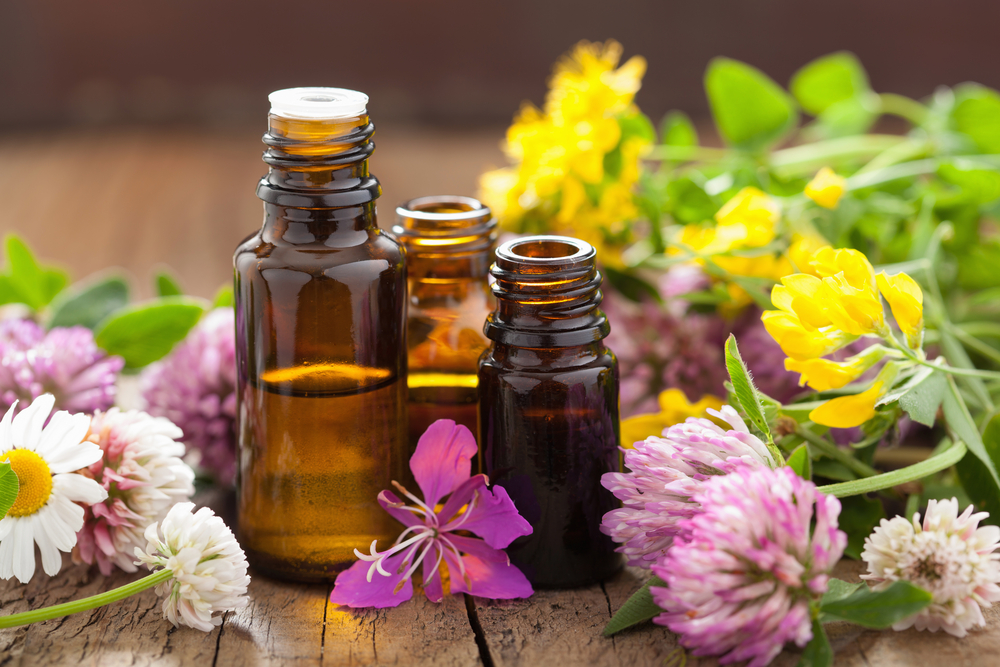
Essential Oils for Travel Related Ailments and Issues
Medical Disclaimer ~ I am not a physician. The information presented here is for general informational purposes only and is not a substitute for medical advice or recommendations from a physician or qualified medical practitioner. The information presented here does not take into account your health, medical, psychiatric, or emotional history or needs. Do not use this information to provide diagnosis nor develop a treatment plan for a health problem or a disease without consulting a qualified health care provider.
If you feel that you are in a life-threatening or emergency medical situation, seek medical assistance immediately
Motion Sickness
- Ginger ~ Coming from an experienced motion sickness mom, ginger is a top natural choice to help control motion sickness from flights, boats, car travel. Travel with ginger in the form of ginger candy, tablets, or Ginger Beer. Plus, Ginger Essential Oil should be added to your motion sickness kit, as well. Ginger Oil diffused into the air, rubbed on your temples and wrist, or even rubbed on your tummy can help with nausea related to motion sickness.
- Peppermint Oil ~ Try Peppermint oil in a diffuser to purify the air or a drop in your muscle rub to relieve muscle tension. Blend peppermint oil with your carrier oil and rub on your stomach for nausea and heartburn. And, bugs don’t like the smell of peppermint.
- Lavender Essential Oil ~ Seems like the cure-all, but use lavender in your diffuser and inhale for relaxation when queasy, especially helpful if your nausea is related to anxiety or nervousness.
Anxiety
- Lavender has been used for centuries to clear the mind and promote relaxation and sleep. Use it topically by rubbing on your temples, or spritzing on your pillow. A few drops in a diffuser in your hotel room, and inhale for peace. Ylang ylang, Cedarwood, and Chamomile are also helpful to calm the mind and encourage peaceful slumber.
Sleep
- Lavender ~ Lavender is the most common essential oil used for relaxation and sleep. Spritz your blanket and pillow before you lie down in bed to sleep.
- Vanilla ~ The scent of vanilla (not a pint of Haagen Daaz) has sedative and relaxing properties and helps relieve stress.
Combine these two oils in your spritz bottle or your diffuser and fall asleep in peace.
Learn more ways to improve sleep while traveling in The Ultimate Sleep Guide: How to Sleep Peacefully While on Vacation.
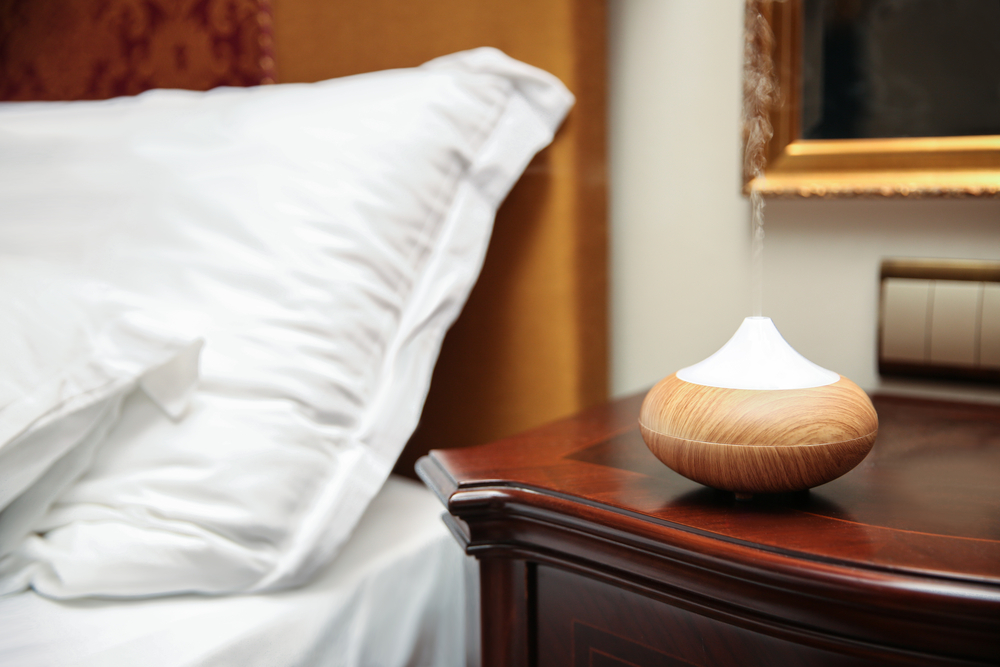
Jetlag
- Lemongrass ~ Add a few drops of this refreshing and invigorating scented oil to your diffuser and liven up, there are lots of places to go and things to see.
- Grapefruit Oil ~ Relieves stress and combats mental fatigue and fogginess, both symptoms you may experience with jetlag. Add a few drops along with lemongrass into your diffuser.
- Peppermint ~ Peppermint is my favorite and my go-to essential oil for perking up in the morning, or when I arrive at a destination. A warm washcloth with a couple of drops of peppermint oil is reviving once you are off of the plane and ready to roll.
Headaches and hangovers
- Peppermint Essential oil topical or diffused. Purchase peppermint oil in roll-on form and use it on your temples and sore muscles for relief of headaches and hangovers.
- Lavender Essential Oil ~ If your headache is due to tension or stress, your best choice is lavender, topical, or diffused oil.
For achy muscles
- Black Pepper Essential Oil ~ Use for sore, achy muscles after carrying that backpack full of everyone’s stuff all day. The tingly, reviving oil soothes muscle tension, and it has an anti-inflammatory effect.
For energy
- Peppermint oil in a warm washcloth for your face or spritz to inhale and feel the awakening effect. Try it for a pick-me-up when you are jet-lagged.
Refresh a stinky or musty room
- Freshen up a musty room with a multitude of citrusy and dreamy essential oils, including orange, lemon, and lemongrass scents. Add a couple of drops of the sweet-smelling and uplifting grapefruit essential oil in the mornings to freshen up your room and start your day off revived and energized.
Bug Repellent
- Several essential oils ward off biting bugs, including the most studied Citronella, but also lemon, lavender, eucalyptus, and tea tree oil, may keep those mosquitos away.
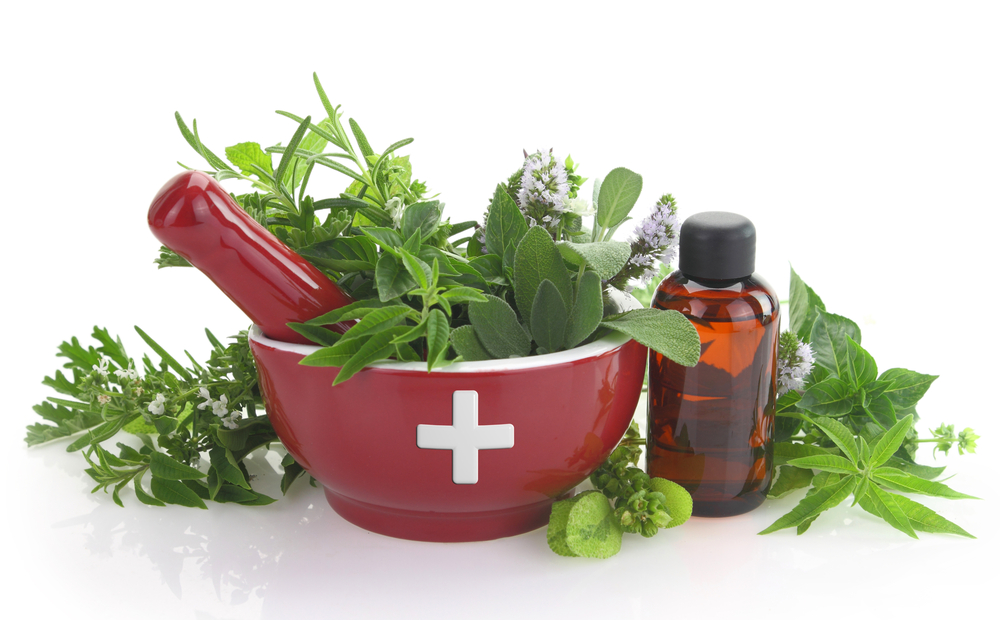
The 11 Most Useful Essential Oils to Pack For Travel
Lavender Essential Oil ~ If I had to pick only one essential oil to travel with, the multi-use lavender would be my pick. Lavender has been used for centuries to calm anxiety, aid in relaxation, jet lag, and help fall asleep peacefully. Rub a tiny bit on your temples to help soothe anxiety while flying, spritz on your pillow and drop into your diffuser before you are off to a peaceful sleep at night.
Peppermint ~ A close second to lavender. Purchase as a roll-on, perfect for headaches and hangovers, or headaches from hangovers. It happens.

Rub a tiny bit on your temples to soothe headaches; roll-on your stomach to relieve stomach aches and nausea.
Spritz into a warm wet washcloth and put over your face to inhale for a little extra pep every morning.
Ginger ~ My family is genetically prone to motion sickness (seriously confirmed by 23 & Me), so ginger is a must in our essential oil travel kit. In addition to ginger candy, ginger tablets, and sometimes Ginger Beer, bring your ginger oil for an upset tummy. Add a drop to your water bottle to soothe nausea and avoid vomiting due to motion sickness from riding in a car, flying, and especially for seasickness.
Related Article…Seasickness: How to Avoid and How to Treat.
Citronella ~ You can purchase a Citronella candle to ward off pesky outdoor insects. But, did you know it comes as an essential oil, too? A tiny dab will keep bugs from approaching, and the smell is so fresh. Citronella has lots of other uses many people don’t know about, including the following.
- Helps decrease the feeling of stress.
- Citronella has antibacterial properties for wound care.
- The scent helps freshen up a stuffy room.
- And it can be used as a surface cleaner.
Lemon Essential ~ Lemon smells fresh and invigorating, but it also has antibacterial properties. Use it to wash your hands, clean surfaces, and add it to your homemade hand sanitizer.
Lemon oil also helps soothe a sore throat and congestion. When I was sick as a little girl, my dad always made me his version of “Hot Toddy,” which he always told me was hot honey lemon tea. Now I know he snuck a splash of bourbon into this concoction to help me sleep. It worked every time (and still does).
And one more thing, bugs hate the smell of lemon.
Tea Tree Oil ~ I love this oil for dabbing on insect bites, as an antiseptic for minor wounds, rubbing on athlete’s foot, and it even helps shrink the sudden appearance of pimples. Plus, tea tree oil is an effective treatment for lice (I know this from experience, yuk).
Chamomile ~ Adds shine and softness to your hair. Especially helpful when sailing or beaching, which can fill your hair with tangles and salt. Add a few drops to your shampoo or leave-in conditioner to help manage tangles and leave your hair shiny and soft.
Black Pepper Essential Oil ~ I am going to go out on a limb by adding Black Pepper Essential Oil. Use this for sore muscles; the tingly, reviving oil soothes muscle tension, and it has an anti-inflammatory effect. After carrying that backpack full of everyone’s stuff all day, black pepper oil is my go-to for sore shoulders and neck.
Sage Oil ~ Purchase a spritzer bottle and fill it up with sage oil and water. Sage oil has antimicrobial properties, and it smells so fresh. Spritz on your face to refresh and wake you up as it also has stimulant features. Sage oil will help wake you up in the mornings and may even stave off jet lag.
Vanilla ~ Helps reduce tension and has soothing properties. Try a combination of vanilla, lemon, and sandalwood for its calming effect at bedtime.
Coconut Oil ~ Versatile coconut oil, used for sun-damaged skin and tangled hair, as a makeup and mascara remover, and for chapped lips. Plus, coconut oil is also used as a carrier oil for blending your essential oils.
Here is the checklist of all of my favorites.
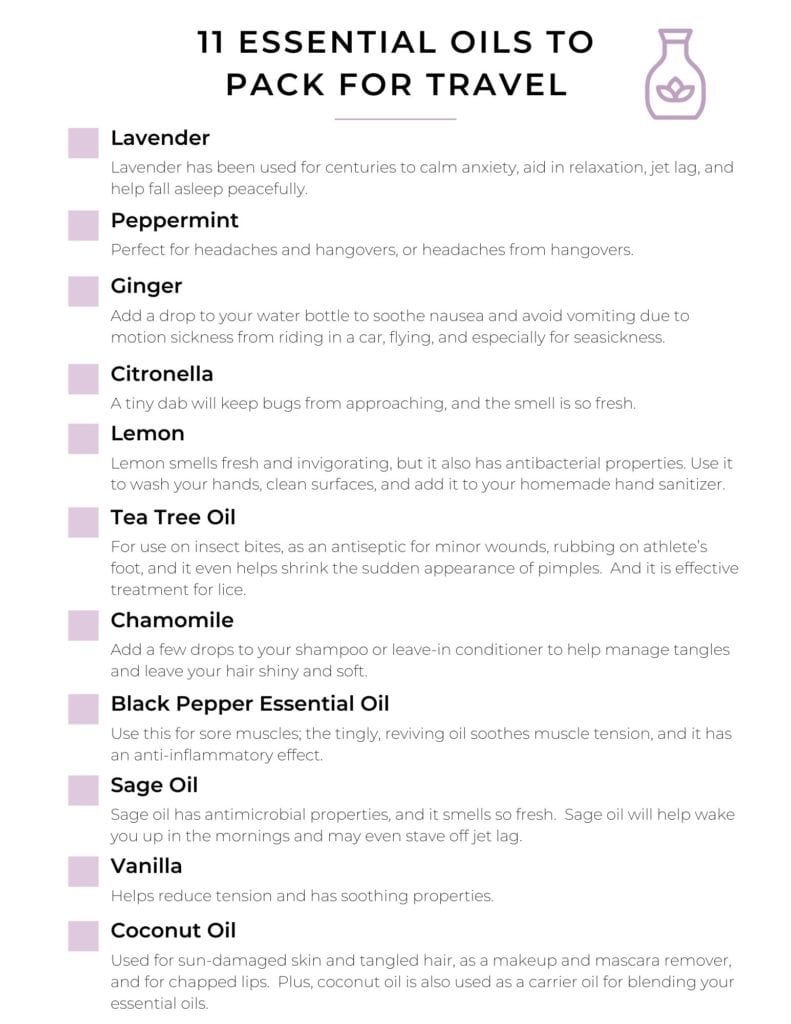
Essential Oils When Traveling with Children
There are a few popular essential oils that should NOT be used with children.
Peppermint, for one, may cause breathing problems with children. Eucalyptus and rosemary aren’t safe either. Here is a list of other essential oils to avoid in children.
- Clove
- Oregano
- Saffron
- Sage
- Sweet Birch
- Lemongrass
When you use essential oils with your children, always do this:
- Do a patch test first. Apply a tiny amount to a small area of skin, wait 24 hours to make sure there is no skin reaction.
- Always dilute the oil before using directly on your child’s skin.
- Purchase oils from a reliable source.
- When storing oils, do so in a cool, dry place, avoid direct sunlight, and keep out of children’s reach.
- Always dilute essential oils in a carrier oil before you use it in the bathtub.
And don’t do this:
- Never use undiluted oils directly on your child’s skin.
- Don’t swallow the oils.
- Don’t use Peppermint Oil, Eucalyptus Oil, or Rosemary Oil on children
- Never use oils near the eyes, ears, nose, or other sensitive areas.
When diffusing oils around your child, do this in a well-ventilated area, and use 30-60 minute intervals.
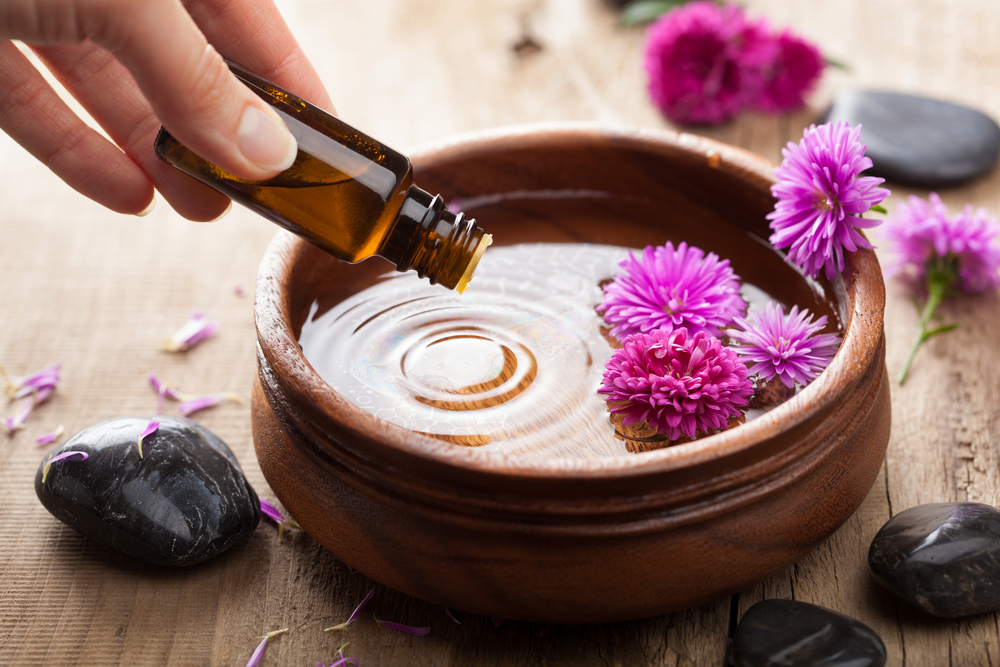
Medical Considerations When Using Essential Oils When Traveling
It is of utmost importance to remember that essential oils are not a cure-all.
Using essential oils to treat minor ailments and issues during travel is generally safe. However, if you develop a worsening of your symptoms, consult a medical professional immediately.
Never treat dehydration, high fevers, severe headaches, confusion, severe pain, or bleeding with essential oils. These are emergent symptoms requiring immediate medical attention.
The FDA does not monitor the manufacture of essential oils, so be sure to research the company where you purchase your oils. A certified aromatherapist can make recommendations for you or consult with your physician or your child’s pediatrician for advice on types of oils and where to purchase.
Pregnant and nursing women are not to use essential oils unless under the advice of an Obstetrician and Pediatrician. It is not known if the effects of the essential oils are passed through breast milk to the newborn.
Side effects from the topical use of essential oils may include redness, itching, hives, and skin burning. If these symptoms occur, discontinue using the oils. Wash the area with soap and water. If you suspect you are having an allergic reaction, notify your health care provider for recommendations.
Side effects from the ingestion of essential oils may include low blood pressure, dizziness, nausea, vomiting, headaches, diarrhea, and fast heart rate. In the event of these side effects, seek medical attention immediately.
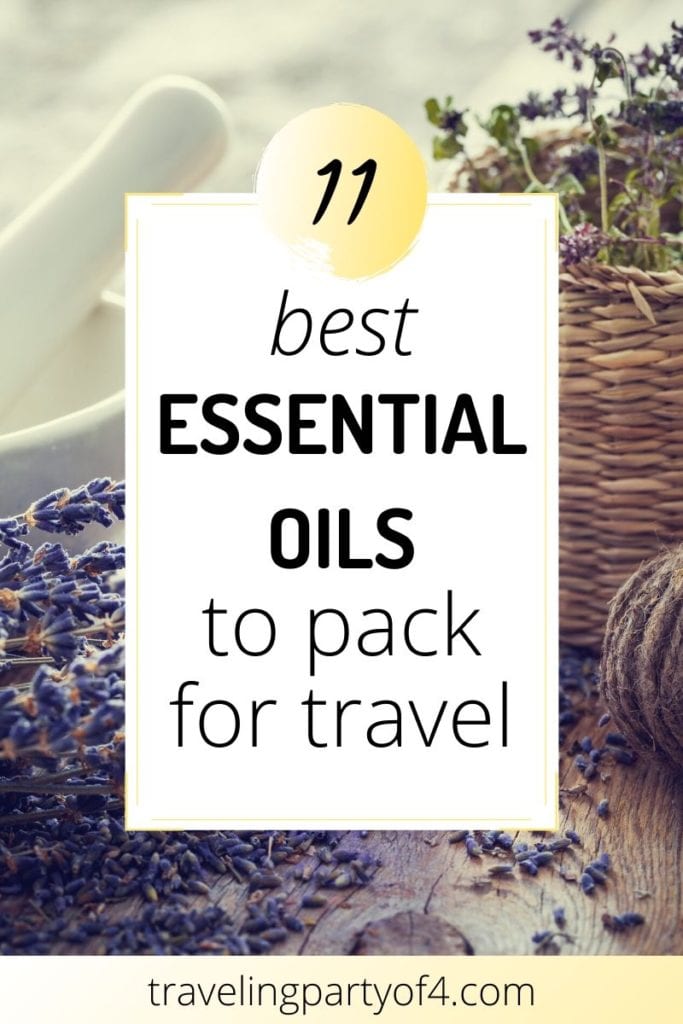
I think I have covered everything I know about using essential oils for travel. What are your favorites? And what have you learned about using essential oils for travel? Drop me a comment below.
Travel Safe.
Stay healthy.
And send me pictures.




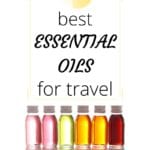
I always travel with a few oils for topical or ingestible use, but never thought of purchasing a travel diffuser. That will be going on my list for sure. Thanks as well for giving me a few new ways to use my oils. They are good for so many different things!
I know. I am learning so much and using them like crazy these days. Love them. Fill that diffuser with lavender and you will have an instant spa!
Your post is so helpful. I used essential oils for a while but started using them seriously when you know what started for immune system boost. Since I travel a lot for work I’ll use bunch of these in the future.
Seriously, I have been using them much more lately, too.
I love these tips. Never know what to do when you have jetlag. Will tag this page for the next time I travel. Thanks for sharing!
Jetlag is for real. We all had it when we traveled to London. I didn’t think it would be that bad. Next time, I will be prepared.
This is a great list and will help me to remember what to use it for. Right now I use Peppermint oil in my camper to keep mice out.
I didn’t know. I will have to add this to my list.
My Mum always travelled with three essential oils: Lavender, lemon and tea tree. She would spray her sheets (lavender) or the car (lemon) as needed, apply to bites (tea tree). I inherited her spray bottles and, of course, have supplies of tea tree and eucalyptus oil. I think you can even use eucalyptus oil for washing (clothes) in a pinch.
Yes, I am completely with her on all of this. I didn’t know about the eucalyptus in the wash, it makes sense though. Maybe add a few drops of lemon, too.
I didn’t even realize Lavender could be used for that many things! Thanks for the information.
And many more. I love this essential oil. My favorite.
Thanks for sharing! I will try the essential mist tip. Peppermint is my fave. It lifts my spirits instantly, whenever, wherever ❤
Mine, too. I love that one. Plus, it is great for headaches.
We have many essential oils on hand for varied uses. Nice post.
This is great information, Jenny! I adore my little roll-on oil and use it often even at home. Makes for a great few minutes of relaxing at the end of a long day.
Great details on how best to use, when and what for. I think you may just become and essential oil guru!
Haha, I am trying.
Been using them for 12 years! Great tips and suggestions. I don’t go anywhere without mine!
I just discovered essential oils about a year ago, I am not nerding out on all of the things I can do with them. Love it.
I am so fascinated by essential oils. I love using natural cures and methods as much as possible. I can especially relate to needing them for headaches and bug repellants when traveling.
I am, too. I am always finding new ways to use them. I just started sprinkling lemon oil into the dishwasher. Smells so good.
This is a great idea to travel with some oils. A friend introduced me to some and I definitely need to get me some ginger for motion sickness.
When Covid19 hit I made sure we ordered some essential oils. My wife also bought this travel sickness mixture which is made up of essential oils which we took on our road trip across the US and Australia – it works amazingly! Such great tips here, thanks so much.
I love them and learning so much about them. I don’t go anywhere without them. And now I am trying all sorts of my own recipes, it’s fun.
Already saved your page for future reference! I travel so much, and I had no idea you could use essential oils for jet lag! Thank you so much for sharing! Fantastic post!
Yes, nausea, sleep, relaxation, energy. All sorts of things.